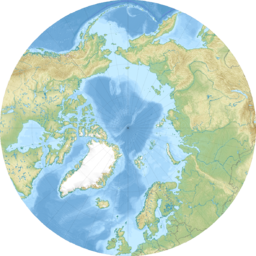
Back Oos-Siberiese See Afrikaans بحر سيبيريا الشرقي Arabic Mar de Siberia Oriental AST Sibiria Bira AVK Şərqi Sibir dənizi Azerbaijani دوْغو سیبیر دنیزی AZB Көнсығыш Себер диңгеҙе Bashkir Усходне-Сібірскае мора Byelorussian Източносибирско море Bulgarian পূর্ব সাইবেরীয় সাগর Bengali/Bangla
| East Siberian Sea | |
|---|---|
 | |
| Coordinates | 72°N 163°E / 72°N 163°E |
| Type | Sea |
| Basin countries | Russia |
| Surface area | 987,000 km2 (381,000 sq mi) |
| Average depth | 66 m (217 ft) |
| Max. depth | 915 m (3,002 ft) |
| Water volume | 57,000 km3 (4.6×1010 acre⋅ft) |
| Frozen | Most of the year |
| References | [1][2][3][4] |
The East Siberian Sea (Russian: Восто́чно-Сиби́рское мо́ре, romanized: Vostochno-Sibirskoye more; Yakut: Илин Сибиирдээҕи байҕал, İlin Sibiirdeeği bayğal) is a marginal sea in the Arctic Ocean. It is located between the Arctic Cape to the north, the coast of Siberia to the south, the New Siberian Islands to the west and Cape Billings, close to Chukotka, and Wrangel Island to the east. This sea borders on the Laptev Sea to the west and the Chukchi Sea to the east.
This sea is one of the least studied in the Arctic area. It is characterized by severe climate, low water salinity, and a scarcity of flora, fauna and human population, as well as shallow depths (mostly less than 50 m), slow sea currents, low tides (below 25 cm), frequent fogs, especially in summer, and an abundance of ice fields which fully melt only in August–September. The sea shores were inhabited for thousands of years[citation needed] by indigenous tribes of Yukaghirs, Chukchi and then Evens and Evenks, which were engaged in fishing, hunting and reindeer husbandry. They were then absorbed by Yakuts and later by Russians.
Major industrial activities in the area are mining and navigation within the Northern Sea Route; commercial fishing is poorly developed. The largest city and port[5] is Pevek, the northernmost city of mainland Russia.[6][7][8]
- ^ R. Stein, Arctic Ocean Sediments: Processes, Proxies, and Paleoenvironment, p. 37
- ^ East Siberian Sea, Great Soviet Encyclopedia (in Russian)
- ^ East Siberian Sea, Encyclopædia Britannica on-line
- ^ A. D. Dobrovolskyi and B. S. Zalogin Seas of USSR. East Siberian Sea, Moscow University (1982) (in Russian)
- ^ William Elliott Butler Northeast arctic passage (1978) ISBN 90-286-0498-7, p. 60
- ^ Forsaken in Russia's Arctic: 9 Million Stranded Workers, New York Times, January 6, 1999
- ^ From Vancouver to Moscow Expedition, Yakutia Today
- ^ History of Pevek, Pevek web portal (in Russian)
© MMXXIII Rich X Search. We shall prevail. All rights reserved. Rich X Search
